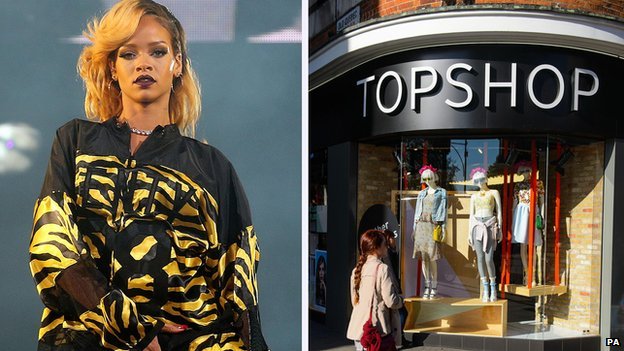Singer Rihanna has won a legal battle against high street store Topshop over a T-shirt bearing her image.
The Court of Appeal in London upheld a ban on the store selling a sleeveless T-shirt featuring a photo of the star without obtaining her permission.
In the first successful celebrity case of its kind, three appeal judges agreed marketing the item without Rihanna’s approval amounted to “passing off”.
“Passing off” refers to the unauthorised used of a personal image.
The star sued Topshop’s parent company Arcadia for $5m (£3.3m) back in 2013 over the T-shirts, which featured a photo taken during a video shoot in 2011.
In his ruling in July 2013, Mr Justice Birss found some buyers would have been deceived into buying the top because of a “false belief” it had been approved by the singer.
He said it was damaging to her “goodwill” and represented a loss of control over Rihanna’s reputation in the “fashion sphere”.
Topshop lawyers had urged the appeal judges – Lord Justice Richards, Lord Justice Kitchin and Lord Justice Underhill – to rule that Mr Justice Birss had misunderstood the law on celebrity merchandising.
Rihanna originally sued Topshop’s parent company Arcadia in 2013 over the T-shirts, as the BBC’s Clive Coleman reports
Geoffrey Hobbs QC argued the court was dealing with a “decorated T-shirt” similar to merchandise featuring images of stars such as Elvis Presley, Jimi Hendrix and Prince.
Mr Hobbs suggested Rihanna was using the law wrongly to claim “only a celebrity may ever market his or her own character”.
Topshop lawyers had previously argued there was “no intention to create an appearance of an endorsement or promotion”.
All three judges unanimously dismissed the appeal.
However, Rihanna’s victory does not necessarily pave the way for other celebrities to sue companies who use their image without permission.
“The court was very keen to stress that there were specific facts that made Rihanna’s case stronger than usual,” copyright lawyer Paul Joseph told the BBC.
He said previous links between the singer and the store – which included competitions and publicity appearances – may have implied an official collaboration.
Additionally, he said: “The image that was used here was actually from the publicity material from her Talk That Talk album.
“These particular factors would make the public think this T-shirt had been authorised by her.”
The BBC’s legal correspondent Clive Coleman said this was the first reported English case of a celebrity claimant successfully relying on passing off to claim compensation for the unauthorised use of their personal image on merchandise.









1 Comments
Merwyn Nazareth
Merwyn Nazareth liked this on Facebook.